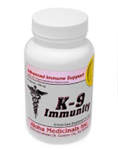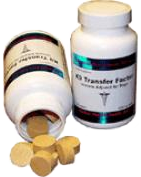Understanding Labwork Values
The following section on normal lab values is for information only. It is not to replace the advice of your veterinarian. You should not use this information in trying to make a diagnosis yourself. Your pet's life is too important to make your own diagnosis! One of the first steps in determining the state of health for a dog is to do a complete blood workup. This involves taking a blood sample and sending it to a lab for testing of various chemical levels, and making a count of the different types of cells present. While bloodwork alone can rarely be used in making a diagnosis, it is an important clue for the vet. Below is an alphabetical listing and definition of normal veterinary ranges in both blood chemistry and blood cell counts. Keep in mind that normal ranges may vary slightly between different laboratories. Also included here is information pertaining to normal body temperature for dogs.
Alkaline Phosphatase (ALKP): 23 - 212 U/L (units per liter) Definition: An enzyme predominantly produced in the liver and bone. Levels are elevated in liver disease. This is also the most important marker in assessing bone cancer. A high ALKP level in a bone cancer patient usually indicates a rapidly progressing disease. On the other hand if the ALKP level is dropping, that usually indicates the treatment is working and the bone cancer is receding.
Alanine transaminase (ALT): 10 - 100 U/L Definition: An enzyme found in the blood which can be found in many tissues of the body but more highly concentrated in the liver.High levels can be an indicator of liver disease.
Albumin (ALB): 2.70 - 3.80 g/dl Definition: Synthesized in the liver, Albumin contains the highest concentration of protein in plasma. It's prime function is to keep fluid from leaking into the tissues and is also a good indicator of kidney and liver disease.
Amylase (AMYL): 500 - 1500 U/L Definition: An enzyme released in the pancreas. Useful in diagnosing pancreatic disorders.
Bilirubin (TBIL): 0.00 - 0.90 mg/dl Definition: Bilirubin is the product that results from the breakdown of hemoglobin in the red blood cells. Abnormal bilirubin can be a sign of liver problems.
Calcium (Ca): 7.90 - 12.00 mg/dl (milligrams per deciliter) Definition: Tests calcium levels in the blood to detect any disorders in the bones or kidneys.
Cloride (Cl): 109.0 - 122.0 mmol/1 Definition: Linked with Sodium, changes in this level often accompany the changes in the sodium level.
Cholesterol (CHOL): 110.0 - 320.0 mg/dl Definition: A steroid made in the liver, it's function is to form cell membranes that are utilized in all parts of the body.
Creatinine (CREA): 0.50 - 1.80 mg/dl Definition: Part of muscle make up, creatinine levels can determine kidney function.
Globulin (GLOB): 2.50 - 4.50 g/dl Definition: A measurement of this protein in the blood.
Glucose (GLU): 77.0 - 125.0 mg/dl Definition: The source of energy for red blood cells, brain and most parts of the body.
Granulocytes (GRANS): 3.3 - 12.0 Definition: Produced in the bone marrow, they comprise 70% of all white blood cells as they include neutrophils, eosinophils and basophils.
Hematocrit (HCT) normal range: 37 - 55% Definition: The hematocrit is the percent of whole blood that is made up of red blood cells. The hematocrit is the compound measure of Red Blood count number and size.
Hemoglobin (HGB) normal range: 12.0 - 18.0 g/dl (grams per deciliter) Definition: Hemoglobin is the oxygen carrying protein in the red blood cells.
Lipase (LIPA): 200 - 1800 U/L Definition: Secreted by the pancreas, lipase values can be an indicator of the function of the pancreas.
Lymphocytes/Monocytes (L/M): 1.1-6.3 Definition: Lymphocytes are produced in the lymph nodes through the body and are responsible for the activity of the immune system by producing antibodies. Monocytes make up about 5% of the white cell count and act as scavengers for the removal of debris from dead tissue and areas of inflammation.
Mean Corpuscular Hemoglobin Concentration (MCHC): 30.0 - 36.9 g/dl Definition: Hemoglobin concentration per red blood cell.
Phosphate (PHOS): 2.50 - 6.80 mg/dl Definition: An indicator on how the body uses calcium and can be an indicator of kidney problems.
Platelets (PLT): 175 - 500 Definition: Also called a Thrombocyte their function is to halt bleeding (form blood clots).
Potassium (K): 3.50 - 5.80 mmol/l Definition: Found in cells, it's main responsibility is to carry different products into and out of the cells.
Reticuloctyes (Retics): 0 - 0.2% Definition: These are immature red blood cells.
Sodium (Na): 144.0 - 160.0 mmol/1 Definition: Measures the amount of sodium in the body and is a indicator of dehydration.
Total Protein (TP): 5.20 - 8.20 g/dl Definition: Consisting of Albumin and Globulin, this result can also be an indicator of liver and kidney disease as well as malnutrition and other conditions.
White Blood Count (WBC) : 6.0 - 16.9 Definition: Measures the white blood cells. White blood cells are the major infection fighting cells in the blood.ﺡ WBC is the most important figure in assessing the condition of a lymphoma patient. A high WBC is an indicator of advanced disease, while a WBC returning to normal (or at least moving towards normal) is an indicator that the treatment is helping. Be aware that steroids such as Prednisone will artificially lower the WBC, so if steroids are being used, the WBC has far less meaning in terms of assessing progress in the patient.
Normal Body Temperature:
The normal body temperature of your dog should range from 101 to 102.5 F. The best way to determine body temperature is rectally. You may also obtain axillary (between the front leg and the body - e.g.: armpit) body temperature readings, but this method is not recommended when an accurate reading is required. You may use a glass mercury or a digital thermometer. A digital thermometer may be more easily read, it's safer, and they are relatively inexpensive to purchase. If the body temperature has exceeded 103 F, contact your vet immediately. This is especially important if your dog is receiving chemotherapy as some chemo drugs can lower immunity and leave them susceptible to infection.
METHOD OF TAKING TEMPERATURE:
When using either a glass or digital thermometer, lubricate the thermometer with a good water-soluble lubricant such as KY. Slowly and gently insert the thermometer into the rectum about 1-2 inches. When using glass, hold in place for 2 minutes; a digital will signal when the reading is complete.
K-9 Immunityﻗ۱ is a serious supplement that your vet should consider adding to the course of therapy he or she is recommending for treatment of your dog's cancer. It contains the most widely used anticancer compounds in the world: PSK, PSP and Lentinan, as well as nearly 200 other closely related heteropolysaccharide immunomodulator compounds. It is available in the USA and most other countries without a prescription. K-9 Immunityﻗ۱ is a daily supplement derived from all natural, all 100% certified organic sources. And it is made in America to the highest pharmaceutical standards. If you are outside the USA, email our order desk for full details on any shipping or permit requirments for your country. We currently ship to over 30 countries, so chances are we can get this to you.









